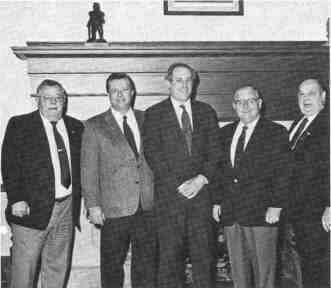FEDERAL UPDATE:
MUNICIPALITIES TO BE AFFECTED BY
AMERICANS WITH DISABILITIES ACT (ADA)
By JAMES McCURDY, Research Associate, Illinois Municipal League
On July 26,1990, President Bush signed into law the
Americans With Disabilities Act (ADA) (P.L. 101-336).
This legislation may have a significant effect on many
municipalities in Illinois, as well as across the U.S.
The ADA is important not only in its provisions, but
also in its intentions, as it follows the path cut by the
Civil Rights Act of 1964, and considers discrimination
against disabled persons to be a breach of their civil
rights.
The Equal Employment Opportunity Commission
(EEOC) and the U.S. Department of Justice are
charged with oversight and enforcement of the provisions of the Act. Sections of the Act dealing with public
services and transportation are being administered by
the U.S. Architectural and Transportation Compliance
Board, and the U.S. Department of Transportation.
Proposed EEOC rules for the ADA were issued in
the February 28, 1991 issue of the Federal Register.
These rules closely parallel the ADA itself, and provide
few insights into the law other than to clarify its intent in
some areas.
What does the ADA portend for municipalities in Illinois?
Its most substantial effects will be felt in two areas:
1) municipal employment and hiring practices, and 2)
provision of all municipal services. These two areas
have been determined by the Act to be sources of
discrimination against disabled persons, and are targets
of this legislation.
Who will be affected by this legislation?
All public and private employers with more than 25
employees Will be subject to compliance with the law as
of July 26, 1992. Smaller employers with 15 or more
employees will be required to abide by its provisions by
July 26,1994. Employers with fewer than 15 employees
are not covered under the mandate of this Act.
Who is protected by the Act?
Under Title I of the ADA, only a "qualified individual with a disability" is protected. They are defined as:
"an individual with a disability who, with or without
reasonable accommodation, can perform the essential
functions of the employment position that such individual holds or desires."
What qualifies as a "disability?"
The Act uses the same definition of "disability" as
the one found in the 1973 Rehabilitation Act (34 CFR,
Part 104): "someone who has a physical or mental impairment that substantially limits them in some major
life activity."
This definition is clarified by the February, 28
EEOC rules, and it is important to note that it may
include, but is not limited to: 1) alcoholics, 2) rehabilitated drug users (current users of illegal drugs are not
"disabled"), and 3) those who are suffering from AIDS
or other related diseases unless they pose a "direct
threat" to other workers that cannot be eliminated by
"reasonable accommodations."
I. The ADA and Municipal Employment and Hiring
Practices
A. Discrimination:
In Title I, the ADA more tightly defines "discrimination", and extends protection against it to "qualified
individuals with a disability" in three main areas: 1)
during the application and hiring process, 2) when performing the essential duties of the position, and 3) when
receiving benefits and privileges of employment enjoyed by other employees who are not disabled.
Some examples of discrimination included within
the Act's definition are: 1) segregating, limiting, or classifying disabled employees, 2) not making "reasonable
accommodations" for an employee's disability (unless
they cause "undue hardship"), and 3) using any employment criteria (such as medical exams before employment or during the duration of the worker's employment) that intentionally or unintentionally discriminate against disabled persons. If medical exams are to
be given, they must be of "business necessity," and be
given to all applicants.
In addition, asking questions concerning the extent,
nature or severity of a potential employee's disability
are prohibited. Employers may only ask questions concerning the ability of the worker to perform the "essential functions" of the position for which they are applying.
B. Reasonable Accommodations/Undue Hardship:
In order to prevent discrimination against the disabled, "reasonable accommodations" must be made in
all cases. However, the subject of "reasonable accommodations" is a gray area that includes, but is not limited to: 1) restructuring of work responsibilities (such as
part-time or modified work schedules) 2) making existing facilities accessible to and usable by disabled persons, 3) acquiring or modifying equipment or other
work related devices, and 4) providing any readers or
interpreters necessary for the employee to function
properly. These modifications may not, however, impose "undue hardship" on the employer.
Under proposed EEOC rules, "reasonable accommodation" is interpreted to mean "any change in the
work environment or in the way things are customarily
done that enables an individual with a disability to
enjoy equal employment opportunities." (Federal Register, 2/28/91, p. 8588)
May 1991 / Illinois Municipal Review / Page 7
"Undue hardship" is also clarified, and is defined as:
"any accommodation that would be unduly costly, extensive, substantial, or disruptive, or that would fundamentally alter the nature or operation of the business." (Ibid., 2/28/91, p. 8596)
A definition for what is "unduly costly" is not included in the rules. EEOC decisions based on cost
factors will most likely be made on a case-by-case basis
taking into account the size and nature of the employer.
In sum, the provisions of Title I of the ADA dealing
with hiring and employment practices may provide
additional legal recourse for disabled persons in cases
where they may have been discriminated against. This
legislation is very non-specific, and it is certainly open
to what may become substantial legal interpretation.
II. The ADA and the Provision of Public Services
A. General:
Under Title II of the ADA, no "qualified individual
with a disability," on the basis of that disability, can be
excluded from participating in any programs or activities of a municipality. They also may not be denied any
benefits of services provided by the locality because of
their disability.
Achieving compliance with this law may require the
provision of TDD (Telephone Devices for the Deaf)
for public information telephone numbers or other telephone services, interpreters and readers for deaf and
blind persons, and any other means necessary to make
the particular public service available and accessible to
disabled persons.
B. Transportation/Barriers to Access:
Under the concept of accessible public services,
transportation services provided by municipalities are
also covered by this Act. Municipal officials will be
prohibited from purchasing new transit vehicles that
are not lift-equipped for the disabled. In addition, the
ADA mandates the provision of paratransit services
that are available on-demand for those who are so disabled as to not be able to use mass transit even after it
has been modified.
Public transit stations (only "key" stations as defined
by the U.S. Department of Transportation (DOT)) for
rail and other types of mass transit must be completely
accessible to disabled persons in all public areas under
the ADA. In addition, at least one car per train of mass
transit systems must be accessible to the disabled.
Proposed construction and architectural rules from
the U.S. Architectural and Transportation Barriers and
Compliance Board (ATBCB) are published in the January 22nd, 1991 Federal Register. These rules specify
construction and building standards that will achieve
compliance with the new law.
It is important to note that current Illinois state rules
dealing with disabled access (Title 71, Part 400 of the
Illinois Administrative Code) may be as stringent in
many areas as those rules proposed by the ATBCB
under the guidelines of the ADA. However, it is very
important that all municipalities be in compliance with
federal law first, and any state laws thereafter. As such,
review of the recently proposed ATBCB rules and any
future DOT rules would be strongly recommended
should questions of compliance arise.
Summary
The ADA is serious federal legislation that may impose considerable costs on some municipalities, and
may not affect others at all. Its provisions may lend
themselves to litigation, increased capital costs, and
more federal oversight of municipal government. All
municipal officials must be aware of this new law and
its effects on their employment and hiring practices, as
well as on their provision of municipal services.
For more information on the ADA, please call Jim
McCurdy at the League office at 217/525-1220. •

State Treasurer Patrick Quinn discussed IPTIP with Mayors visiting
the League Headquarters.

Beginning with the next issue Secretary Ryan will be providing informational articles about services and programs in the Secretary of
State's Office.
Page 8 / Illinois Municipal Review / May 1991